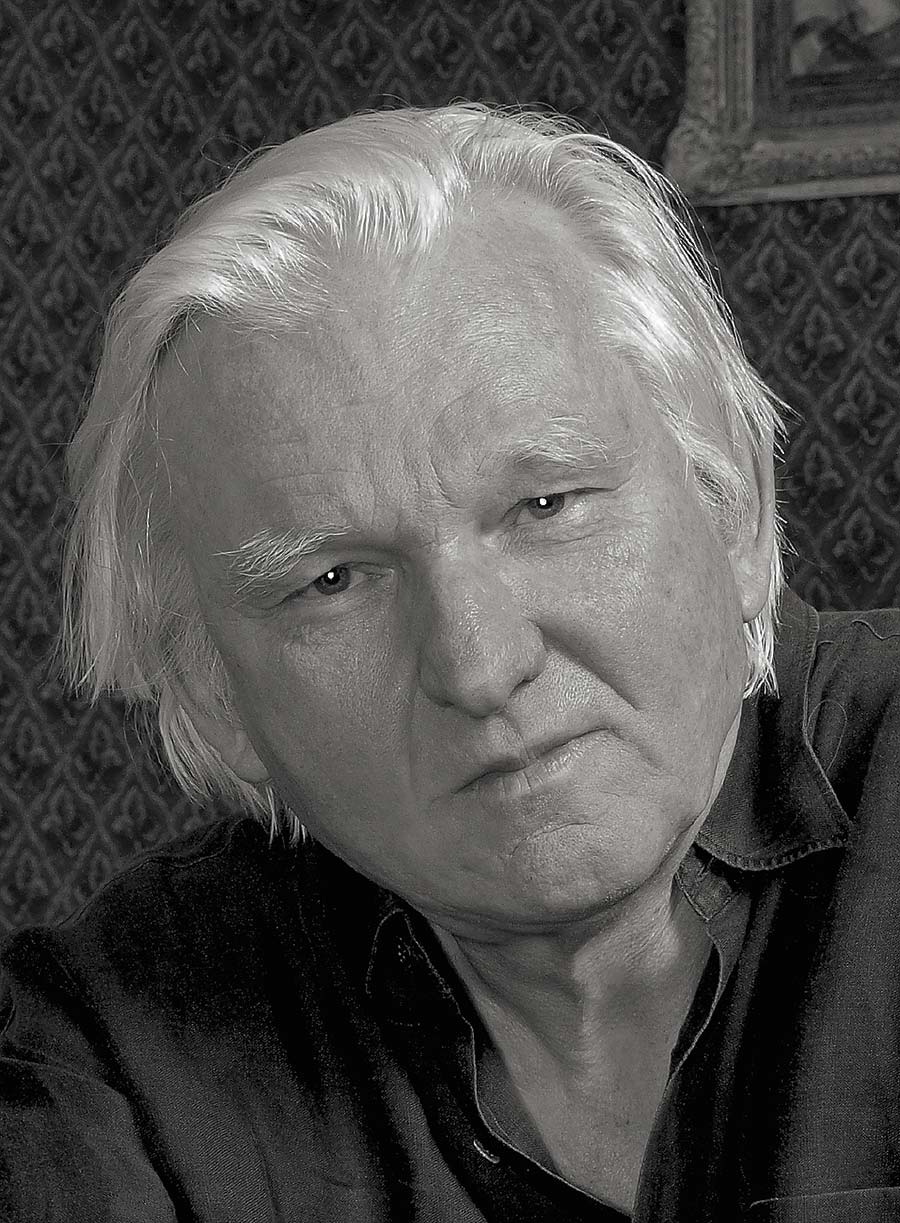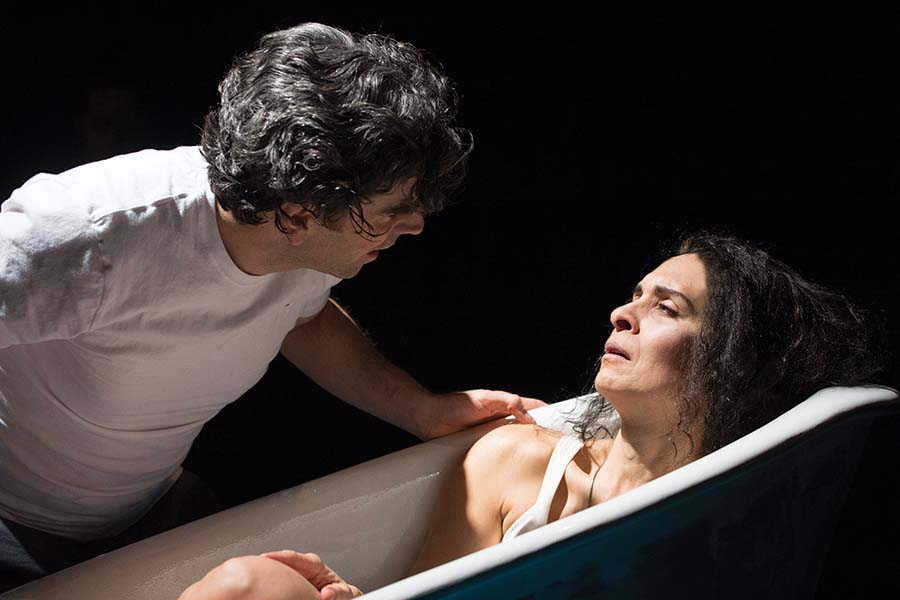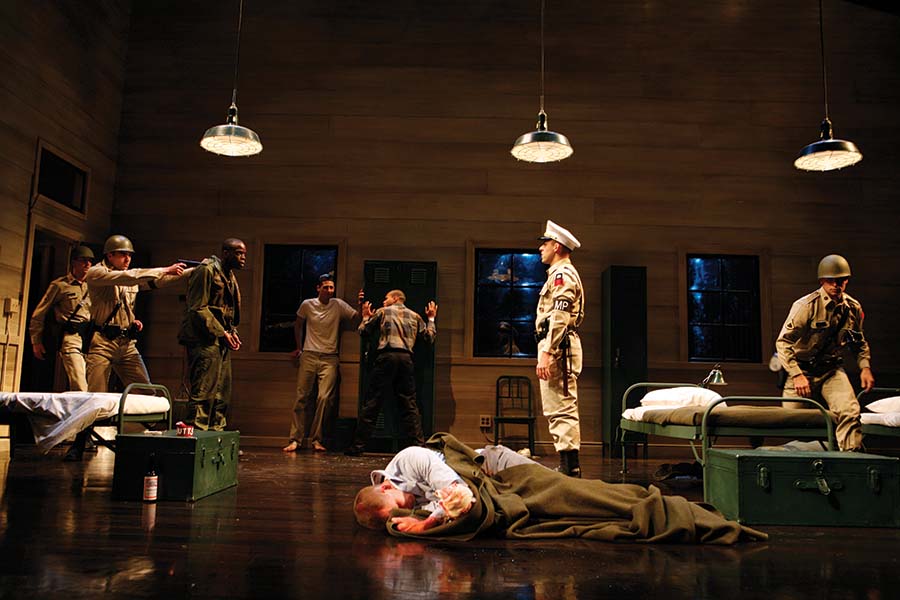Let me tell you a story about a Carolina summer evening 19 years ago, when a recruit did something that got our sergeant’s attention; the sergeant stopped pacing, then shushed our recitation of the Rifleman’s Creed. A chill must have walked the spine of other recruits as it did mine. But instead of bellowing at us, the sergeant took his “Smokey Bear” from atop his head, covered his face in order to maintain military bearing, and laughed into it. We kept our bodies locked at attention, daring not to eyeball him.
What stayed with me about Sergeant Chase’s behavior that evening was that in his breaking the fourth wall I was able to recognize the purposeful nature of his acting. Indeed, though the man himself was a genial, good-natured fellow, in the role of Marine Drill Instructor his countenance and behavior had to change to reflect his rank and position.
I haven’t thought about Sergeant Chase for many years, but in a winding way this story makes me remember how disordered my first years out of the Marines had been.
I left the active duty Marine Corps in 2002 intending to go into law enforcement, but after my Iraq deployment in 2003 in the Marine Reserves, I experienced a fundamental shift in my thinking and decided I could not and would not carry a weapon or wear body armor as part of my work any longer. I was unmoored and confused, but this moment of crisis ultimately led to a writing class at New York University and a playwriting lab at Columbia, places I found structure and purpose and felt empowered to think of myself as a writer.
Now, as Theatre Communications Group’s artist-in-residence, I’ve been fortunate to be invited by theatres to observe their processes as they work to empower service members and veterans to tell their own stories. Most recently, at Syracuse Stage in upstate New York, I sat with several hundred people in the theatre and another 800 watching on Facebook Live as a group of veterans from Syracuse University read a new play they had been working on. The play had been developed in partnership with the theatre and was culled from their own stories. Listening to these stories, I kept hearing echoes of my own: being so gung-ho that I joined the Marines at 17; trying to figure out how to start life after the Marines.
Syracuse is not unique. Similar activities are happening in Wisconsin, Pennsylvania, North Carolina, Florida, Texas, California, D.C., and New York, to name a few. Sarah Hart’s piece on p. 30 does a great job of describing some of these efforts; I hope you’ll take a look.
In Syracuse, at the end of the night, I wondered whether the experience of writing down and then sharing veterans’ stories aloud had been cathartic for them. I quietly remarked to my hosts how incredibly courageous it was for these veterans to have performed in front of us; how necessary it is to hear these kinds of stories, especially from those that are closest to us. That experience made me wonder who in the room might write this generation’s definitive war play.
On the subject of generations and their war plays, I and the American Theatre editors thought of two playwrights who have arguably written some of the most important plays about the wars of their time: David Rabe and Quiara Alegría Hudes. A veteran and the relative of veterans, respectively, each wrote acclaimed trilogies of plays about the Vietnam War and the Iraq War, among plays on other subjects. We recently engaged the two in an email correspondence about their approaches to writing, and specifically to writing about war and its fighters.
Let me begin by asking about your first creative instinct. If playwriting was not your first artistic impulse, how did you come to playwriting?

David Rabe: It was acting. And it started with James Dean. I was a high school “jock,” though with something brewing. Football had been my game, and then in the spring of my senior year I saw in James Dean the possibility that one could take the mess inside and turn it into something. The idea of transforming that mess was my sense of a creative impulse. It expanded pretty quickly to include writing—in college I did both; I had a wonderful creative writing teacher. And I did a lot of acting at the girl’s college across the hill, because they had a theatre department and also because I didn’t trust the man who ran the theatre program at my college. Most of the writing at this point was fiction, though I did some playwriting.
Quiara Alegría Hudes: I was trained as a composer, but like Albee, perhaps, I was no good. (His words, not mine.) I studied composition at Yale, and discovered the profound divide between music in the academy and music in the world. I could never quite figure out how to bridge the divide in a way that I found artistically and spiritually true. When I began writing I had much more clarity about the means and the end.
Could you share a little about your process? For example, do you write first thing in the morning and edit in the evening?

Hudes: As a mother who works at home, I just write whenever I can. When the kids are out of the house. It’s pragmatic.
Rabe: My process is somewhat chaotic, though I try to get to it every day and succeed more often than not. I have many things started, and have a knack for going back and linking up with material begun at an earlier time, often feeling that my later sensibility can fathom what I couldn’t at the earlier point while keeping what was alive and organic from then. Some things go from start to finish. But most lurch a bit before getting to their end. I doubt this is a common method—this starting and stopping for a long period of time—but it’s organic to me. I often play music, sometimes classical, sometimes sappy. Lately it’s Tibetan chants for the most part.
Quiara, what excites your imagination?
Hudes: For me, music. I’ve taken inspiration in Bach fugues, Coltrane, and Yoruba Lucumí drumming. The childhood influences remain potent: the topics of AIDS, the drug wars, the culture wars. Also the aesthetic of chaos and anarchy that permeated the art of the time. Additionally, my mother’s Lucumí religious practices continue to spark my imagination and perk up my ear.
So David, you came on the scene with a trilogy of plays about the Vietnam War: The Basic Training of Pavlo Hummel, Sticks and Bones, and Streamers. What inspired them?
Rabe: I was drafted in ’65, at a time few of us had even heard of Vietnam. That changed during basic training. I shipped over in January ’66 and came home after a year. I’d been very lucky over there, assigned to a medical headquarters in support of surgical and evacuation hospitals. I was what the guys in the “boonies” thought of as a “rear-echelon asshole”—I had it easy, relatively speaking. The area was pretty safe, never “hit” while I was there, though they were later hit in the Tet Offensive.
Anyway, I came home, knocked around and went back to school. I’d been in a theatre grad program when I dropped out in ’64, which led to my getting drafted in ’65. When I was back in the department, a teacher said to me one day something like, “You must have a lot going on about whatever happened over there.” And I thought, “Okay.” I started Pavlo first; then, before I was finished with it, went into Sticks and Bones. I was pretty angry. I don’t know why I made the lead character blind. It was instinctive. I worked on parts of Streamers and The Orphan, too; I think I wanted to do as much damage as I could with a play.
And Quiara, you too wrote a trilogy about a veteran impacted by service in Iraq: Elliot, a Soldier’s Fugue, Water by the Spoonful, and The Happiest Song Plays Last. What inspired you?
Hudes: My younger cousin fled the fallout and snares of the war on drugs in Philadelphia by enlisting. It was his means to a paid salary, to an honored place in society. Whereas the neighborhood he grew up in suffered from the fallout of the crack epidemic and its financial and carceral realities. This cousin returned from his first tour in Iraq with a severe leg injury. I met him in California, where he was stationed on base while he recovered, and I registered an immediate but subtle change in his eyes. I needed to understand what had changed, how his selfhood and manhood had developed during his active military duty. Fugue is me trying to understand.

Quiara, one of the most surprising moments in Elliot for me was when we learn that Pop, who served in Vietnam, threw Grandpop’s flute in the river—an instrument that had brought joy and comfort to Grandpop and to the soldiers with whom he served in Korea. It served a similar purpose for Pop in Vietnam, but Elliot would unfortunately be without it in Iraq.
David, in Sticks and Bones, I was most surprised when Ozzie the father of David, a blinded Vietnam War veteran kills Zung, the ghost of a young Vietnamese woman with whom David had relations. Up to that moment it appears Ozzie, Harriet (David’s mother), and Rick (David’s younger brother), are unaware of Zung’s presence. Could you tell us how Zung goes from an ephemeral ghost character to a corporeal character who can be murdered? Or have I misread the play; has she been visible all along?
Rabe: The way Sticks and Bones wants to operate is that Ozzie, Harriet, Ricky, and even David are unaware of Zung at the beginning—or at least they pretend they are. David, however, senses her, both fearing and needing her. The family is blind to her, and in a metaphoric sense blind to him—they see him but don’t want to see what he is. At the end of Act I he can resist Zung’s presence no longer; she invades him with a power of the horror, guilt…madness? Something he must recognize. From then on they face a poisonous truth that infects and disrupts the family order, the norms and protocols they live by. By the end David and Zung have taken over the house and the family must either join them and accept that the world is as they see it and say it is, or they must kill them. So they kill them.
What moment surprised you in each other’s play?
Rabe: In Elliot, there were a number of surprises, but the ending is what most caught me off guard. It was utterly unexpected, while perfectly organic: the familial/choral presentation of three generations of men assembling to ship out. As the scene took shape and it dawned on me what was happening, as Elliot, Grandpop, and Pop lined up and stood the way soldiers do with their duffel bags at their feet and then picked them up—decades apart and yet side by side—the cost to this family was unbearably sad and yet beautiful in the art of its depiction.
Hudes: There are some similarities in our homefront plays. We’re both dealing with willful blindness and deafness. We’re dramatizing the silences that happen in the domestic realm in relation to war’s realities—because how can one converse about the reality of war without that reality infecting our living rooms, breaking our illusions and sense of goodness? American society rewards self-proclaimed innocence. Everyone in Ozzie and Harriet’s house puts on an innocence show—though they are far from innocent, they are so very effective at convincing themselves and others of their lovely, orderly ease, their innate “goodness.” Of course, at the end, we realize they all see Zung. They have seen her and known her all along. They just use language tricks to pretend they don’t—to pretend there’s some unknowable evil offstage and overseas. At one point Ozzie has a nightmare and calls out, screaming. Then he asks, “Did anybody hear me holler?” and Harriet responds, “Not me.” Though she heard. We all heard.
David, in Sticks and Bones, Sergeant Major delivers a blinded David to his family. Sergeant Major’s description of destroyed bodies and minds reads as particularly blunt and honest. That David’s family is bewildered by his presence also feels true. What do you want an audience to take away after seeing this exchange?
Rabe: More often than not, the audience, like the family, feels disoriented and alarmed. What are they to do? What lies ahead? I think as I wrote it, I thought audiences would recognize something in this moment that they’d been waiting to hear, that they might even feel relieved to hear being spoken. But over time I’ve seen that while some try to open to the moment, however alarming, there are others who start looking for the exit door. In the initial production the exit door got a heavy workout. But then, the play is a kind of assault.
Quiara, likewise, in Elliot, a Soldier’s Fugue, both Elliot and Pop receive similar injuries to their legs and both are treated by Ginny. She heals their physical damage, but I suspect Pop and Elliot have deeper wounds that is described as a moral injury related to killing in combat. Do you think so?
Hudes: I interviewed my uncle, George, who was a Marine in Vietnam. An extremely jolly, lovely man, very easygoing. But he never spoke of his military service—it was an unspoken rule that we honor his silence by never asking about it. His wife shook her head when she learned of the upcoming interview: “He doesn’t open up about it.” So when the day came, I asked him one question: “What year did you enlist?” That was it, one question. And he started talking and three hours later he was still going. My prepared questions were useless. He led the way. He called me the following week and thanked me. “I haven’t felt this light in 30 years,” he said. “I usually don’t sleep. This week I slept.”
It dawned on me: There’s no acceptable way of talking about ugliness in our culture. Even among those we love, we are conditioned to pretend ugliness isn’t there, to pave it over with silence and petty conversation. Tio George just needed a framework where he knew that the ugliness could be acknowledged, that the ugliness would have a place in the room. A “moral wound” cannot heal if we cover our ears and close our eyes. Even dealt with head-on, the moral wounds of war are profound and may never fully heal. God help us all, in silence wounds fester.
In regards to your writing, what are your thoughts on authority?
Rabe: When I was a kid in the Midwest in the ’50s, authorities were believed, trusted, respected, and at least to my young mind they deserved it. By the time I was out of college in the ’60s things were shifting—the Civil Rights movement, the women’s movement, and the Vietnam War were exposing a duplicitous, shadowy, unscrupulous, scheming side to authority. As I wrote my plays in the late ’60s, early ’70s, The Basic Training of Pavlo Hummel, Sticks and Bones, Streamers, and The Orphan, this vision of “authority” as a demon was on my mind as it was on the minds of many others. But as we took on the demon, our longing to escape the personal and societal restrictions hemming us in tricked us into mistaking our longing for everyone’s. I think there was an underlying sense that, given the opportunity to break free, every human being would take it. But this is and was a naïve idea. The unscrupulous and scheming, the deceivers are people too. And they are people who want to be as they are. They’re not looking to change. What they’re looking to do always and only is to refine their methods, to make their deceptions even more cunning, their schemes even more hidden and subversive, their restraints even more repressive.
Hudes: There’s a scene in Fugue where Elliot is preparing for his first sniper attack in the field. When he pulls the trigger, rather than use a sound effect I have the actor say, “Bang.” Not shout it. No exclamation point. Just say it. And it’s purposefully stylistically out of sync with the naturalistic dialogue that precedes and follows. I cannot recreate a battlefield experience onstage with any verisimilitude—I don’t have the authority to do that, because I’ve not seen it. What I can do is create a psychic space, a storytelling space, where we focus the ear and the mind. I have no clue what the battlefield is like. But I do know what veterans told me—the looks in their eyes, the energy of their voices, the emotional tone to the lingering echoes of their experiences. Those emotional cadences live in “Bang” for me.
Maurice Decaul, a former Marine, is a poet, essayist, and playwright, whose writing has been featured in The New York Times, the Daily Beast, Sierra Magazine, Epiphany, Callaloo, Narrative, The Common, and others. His poems have been translated into French and Arabic, and his theatre pieces have been produced in the U.S. and Europe. Decaul is TCG’s first artist-in-residence, and in that position he works with the Veterans and Theatre Institute.


